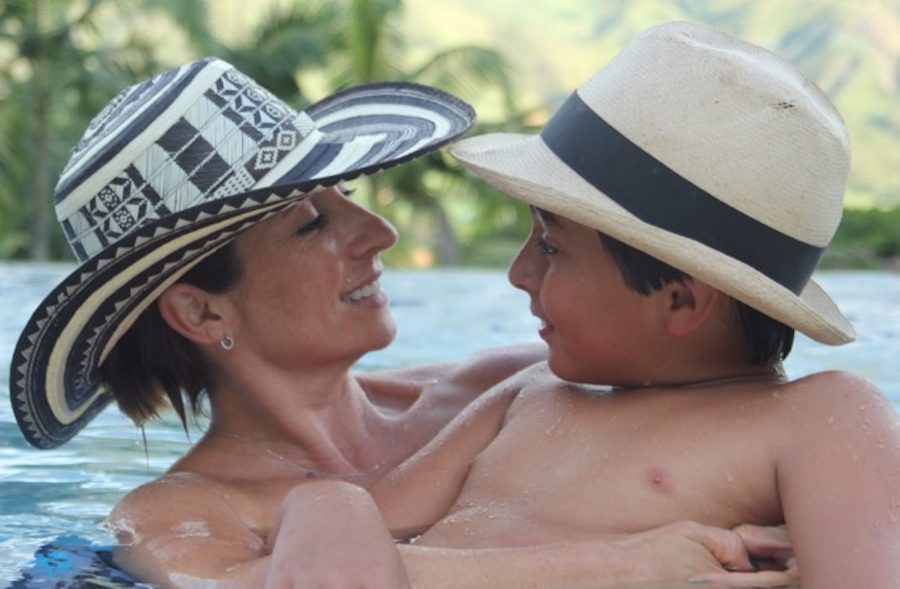Culture shock: Identity means everything
Colombian mother, Natalia Alarcon, embraces her son in front of the mountains of Medellin, speaking to him about the beauty and importance of Colombian heritage. Those enveloped and in love with their culture feel that their roles consist of passing forth the customs to their children, allowing for the culture to live on through generations.
December 19, 2016
Cultural identity gives a sense of belonging and comfort. Embracing this sense of comfort creates daily challenges for those of different nationalities. Acknowledgement of diversity needs acceptance and freedom of expression in today’s society.
“Some people are ashamed of being Hispanic but I absolutely love letting everyone know where I come from and who I am,” sophomore Sophia Praino, who boasts Colombian heritage, said.
In America’s current society, cultural identity retains importance but insufficient portrayal. The suppression of cultural identity does not necessarily come from the laws in the country, but more from the people prohibiting the flourishing of diverse cultures.
“Where and when I grew up, equality did not exist,” Robert Lee, now a father of four and an Asian-American with pride, said. “At times, I was embarrassed of being who I was. I grew up hearing constant racial remarks about my culture and I thought it was the norm. I thought I was a lower class citizen. As I got older and more bold, I embraced who I am and the culture that makes me the person I am. I am proud to be an Asian American.”
Though I have been teased and shamed for making my nationality evident, I continue to embrace my culture. From high schools to workplaces, those who express their customs face belittlement and end up in a state of shame. Though society impacts the expression of one’s culture, those with different nationalities must keep in mind that they possess absolute control over their children’s inheritance of traditions and customs. Confidence in heritage allows everyone to accept diversity and for cultures to continue on to future generations.
“I have never worried about me not being able to pass on my culture. It has worked out so well with my parents, even when my mom and dad are from two totally different countries. I think that I will definitely be able to pass on my heritage,” junior Sophia Weber, a foreign exchange student from Germany, said.
The possibility of my children inheriting the culture and traditions I maintain today remains stymied by today’s society, but my passion for my Colombian heritage perpetuates my urge to propagate the culture.
Various elements in each and every culture create diversity and beauty. Food will always define the tangible elements of each culture. Within certain recipes lies memories, love, and generosity.
“Every time I eat a meal my grandmother always cooks, it takes me back to Mexico and makes me think about my heritage,” sophomore Karen Flores said.
The aroma of nostalgia that takes over when I smell freshly brewed coffee brings warmth to me and a sense of peace to my mind. I hope that my children will one day taste a dish that will instantaneously bring them back to the simplest and happiest times of their lives.
Cultural identity begins to impact personality and eventually defines the character of a person.
“Personality is obtained through culture and not biology,” Franz Boas, pioneer of Psychological Anthropology, said in Does Culture Affect our Personality?
Culture begins to influence the way people act, feel, and live. I feel that my Colombian heritage molds me into an outgoing and caring person and will forever impact my persona.
Not only does culture impact those of different nationalities, but it affects anyone exposed to these diverse customs. Cultural acceptance grows to retain importance in the liveliness of each and every heritage, and eventually creates a melting-pot in society emitting eccentric aromas from a vast amount of cultures. This universal impact, which cultures put forth, affects more people, opening vessels for heritage to live through.
“Being best friends with someone from a different culture has broadened my vision and thoughts so much. The experience of dancing, learning how to cook different dishes, and having certain religious views all have changed my life, in a good way,” sophomore Isabella Keaton said.
Origin gains sentimental importance over time and through experiences. After realizing my nationality, people would belittle my country, routinely.
“I thought Colombia just made cocaine and stuff.”
“I would never want to go, I’d probably get kidnapped or shot.”
I found myself aggressively defending Colombia, emphasizing the beauty, and the spirit of the heritage. Trying to explain my love for the country to someone who retained no sense of cultural pride usually resulted in a waste of breath. My passion did not diminish but remains with me, for it flourished within me from a young age.
At five years old, my mother laid physically paralyzed in bed, diagnosed with Myasthenia Gravis. Though near impossible, she managed to smile while I sung Colombian folk songs to her, read her tall tales from her childhood, and tried my best to make her favorite dishes. At this time, the Colombian culture truly impacted my life, my mother’s, and my family’s.
At 10 years old, I sat with my grandfather at the foot of Colombia’s breath-taking mountains, both observing the beauty in front of us, listening to toucans calling and soft salsa music in the background. Him, with his whiskey on rocks, and me with my chocolate milk, he smelled the air and said, “Kid, never lose pride in being Colombian, never.”
My grandfather and I sat, savoring our drinks, discussing the significance of the yellow, blue, and red on the flag and talking about my future children, his future great-grandchildren, and the absolute importance of their love for the country. I now realize the importance of cultural identity and that I must savor and appreciate it like my grandfather does his whiskey.
“My culture is important to me because it represents something bigger than myself, if that makes sense. I will always be proud of who I am and I will always be grateful to my culture for making me who I am,” Praino said.
Cultural identity molds and defines those of this generation. It grows in importance, and with that, its presence must grow. To allow heritage to impact future generations, we must fuel the melting pot that with holds this diversity. Society must not let these vital traditions and customs die out, for they will determine the morality and characteristic compositions of each and every millennial, staying in their hearts and defining the kind of people they will become.







